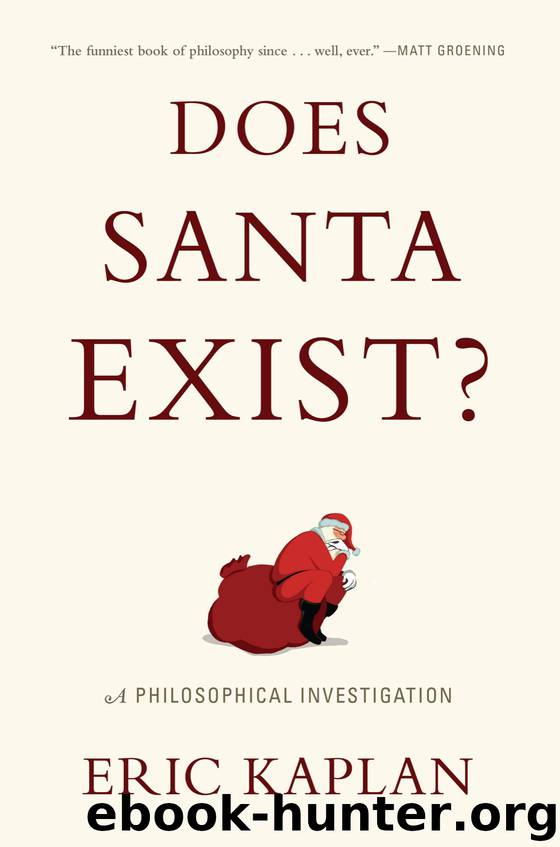Does Santa Exist? by Eric Kaplan

Author:Eric Kaplan
Language: eng
Format: epub
Publisher: Penguin Group US
Published: 2014-09-22T16:00:00+00:00
9
Pain Is Comedy Minus Time
As luck would have it, the television show The Big Bang Theory has a scene that deals explicitly with one of the themes of this book: whether and to what extent science and rationality can explain us and our lives. Sheldon Cooper, the self-obsessed, emotionally chilly physicist, and his girlfriend, Amy Farrah Fowler, the neuroscientist who is in love with him, have an argument about the relative explanatory power of physics versus neuroscience. They join their friends in the cafeteria at Caltech:
Sheldon: Greetings.
Leonard: Hey.
Sheldon: I brought Amy here to show her some of the work I’m doing.
Amy: It’s very impressive, for theoretical work.
Sheldon: Do I detect a hint of condescension?
Amy: I’m sorry, was I being too subtle? I meant compared to the real-world applications of neurobiology, theoretical physics is, what’s the word I’m looking for? Hmm, cute.
Leonard and Howard together: Oooh!
Sheldon: Are you suggesting the work of a neurobiologist like Babinski could ever rise to the significance of a physicist like Clerk Maxwell or Dirac?
Amy: I’m stating it outright. Babinski eats Dirac for breakfast and defecates Clerk Maxwell.
Sheldon: You take that back.
Amy: Absolutely not. My colleagues and I are mapping the neurological substrates that subserve global information processing, which is required for all cognitive reasoning, including scientific inquiry, making my research ipso facto prior in the ordo cognoscendi. That means it’s better than his research, and by extension, of course, yours.
Leonard: I’m sorry, I’m-I’m still trying to work on the defecating Clerk Maxwell, so . . .
Sheldon: Excuse me, but a grand unified theory, insofar as it explains everything, will ipso facto explain neurobiology.
Amy: Yes, but if I’m successful, I will be able to map and reproduce your thought processes in deriving a grand unified theory and, therefore, subsume your conclusions under my paradigm.
Sheldon: That’s the rankest psychologism, and was conclusively revealed as hogwash by Gottlob Frege in the 1890s!
Amy: We appear to have reached an impasse.
Sheldon: I agree. I move our relationship terminate immediately.
Amy: Seconded.
Sheldon: There being no objections . . .
All: No, uh-uh.
Sheldon: The motion carries. Good day, Amy Farrah Fowler.
Amy: Good day, Sheldon Cooper.
Howard: Women, huh? Can’t live with them, can’t successfully refute their hypotheses.
Sheldon: Amen to that.
This scene grapples with a contradiction. On the one hand, it seems that physics should explain biology. On the other hand, it seems that biology should explain physics. Intellectually, we shuttle back and forth. But the approach of the writer—me—is comedy. It has something in common with mysticism because it does not try to defuse the paradox—it accepts that falling into paradox is part of life. But it has something in common with the logical approach because it doesn’t ask us to just revel in paradox—we get an outside perspective that criticizes both of the paradox’s horns. We see that both Sheldon’s and Amy’s perspectives are limited because they are ignoring another level of what’s going on—namely that they are a boyfriend and girlfriend having a fight about what the terms of their relationship are going to be, and how they can maintain their individuality while committing to a relationship.
Download
This site does not store any files on its server. We only index and link to content provided by other sites. Please contact the content providers to delete copyright contents if any and email us, we'll remove relevant links or contents immediately.
Spell It Out by David Crystal(36110)
Professional Troublemaker by Luvvie Ajayi Jones(29651)
The Secret History by Donna Tartt(19058)
We're Going to Need More Wine by Gabrielle Union(19035)
Cat's cradle by Kurt Vonnegut(15339)
The Goal (Off-Campus #4) by Elle Kennedy(13658)
The Social Justice Warrior Handbook by Lisa De Pasquale(12187)
The Break by Marian Keyes(9358)
Crazy Rich Asians by Kevin Kwan(9280)
The remains of the day by Kazuo Ishiguro(8981)
Thirteen Reasons Why by Jay Asher(8894)
Educated by Tara Westover(8047)
The handmaid's tale by Margaret Atwood(7757)
Giovanni's Room by James Baldwin(7330)
Win Bigly by Scott Adams(7184)
This Is How You Lose Her by Junot Diaz(6877)
The Rosie Project by Graeme Simsion(6381)
Six Wakes by Mur Lafferty(6243)
The Power of Now: A Guide to Spiritual Enlightenment by Eckhart Tolle(5761)
